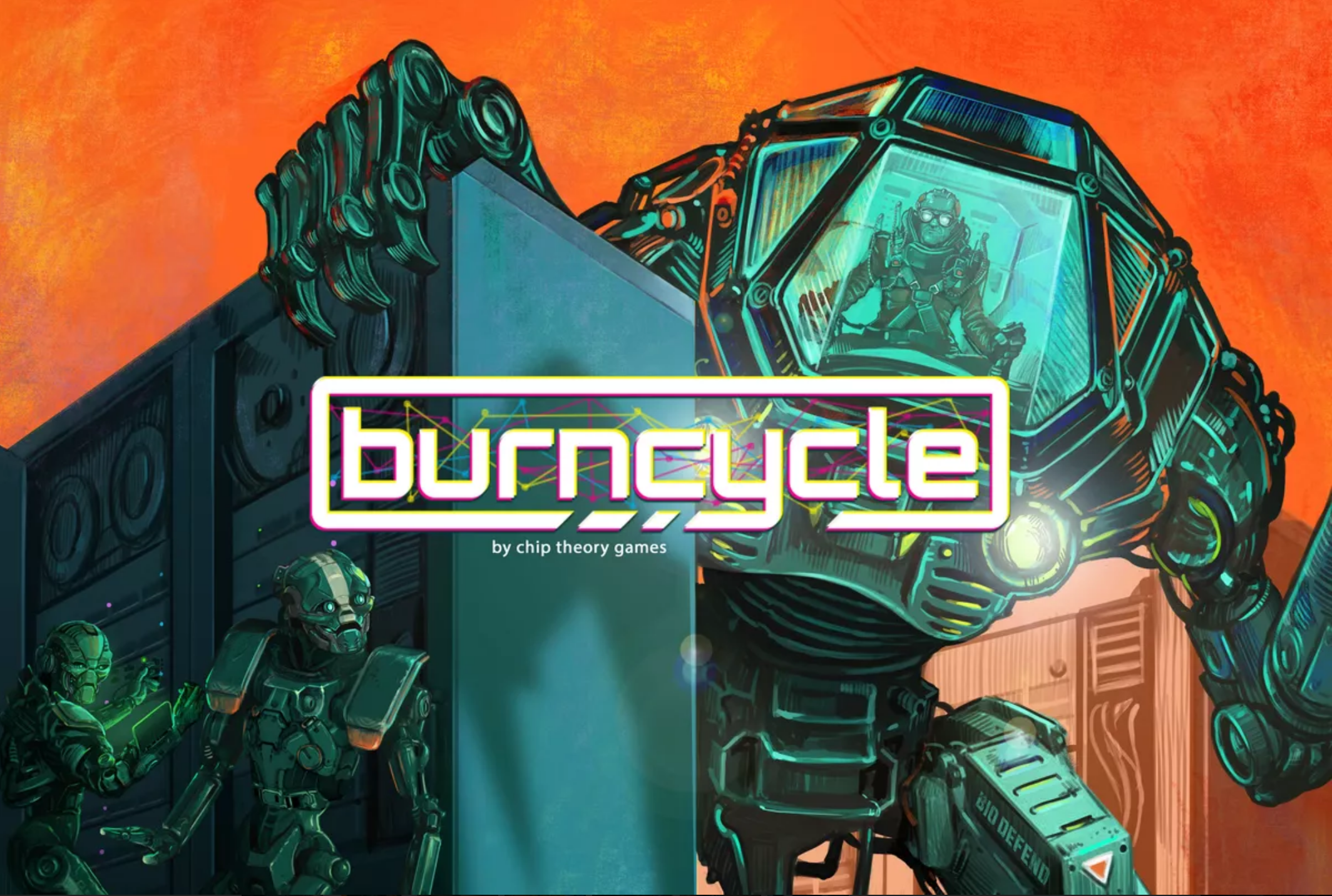Kickstart This! #303: burncycle

Designers: Josh J. Carlson (Cloudspire, Too Many Bones, Too Many Bones: Undertow), Adam Carlson (Cloudspire, Too Many Bones, Too Many Bones: Undertow)
Artist: Anthony LeTourneau (Cloudspire, Too Many Bones, Too Many Bones: Undertow)
Publisher: Chip Theory Games (Cloudspire, Too Many Bones, Too Many Bones: Undertow)
Genre/Mechanisms: action points, action queue, adventure, exploration, cooperative game, dice rolling, die icon resolution, grid movement, modular board, moving multiple units, puzzle, resource to move, scenario/mission/campaign game, solo/solitaire game, spies/secret agents, tech trees/tech tracks, variable player powers, variable setup
Funding Status: At the time of this posting, burncycle is already fully-funded. Pledges currently total more than 8x the initial funding goal with less than 2 days to go on the campaign.
Player Count: 1-4
Solo Mode: yes
Complexity: heavy
Risk: low
What It’s About: “A puzzly infiltration game for 1-4 players, burncycle puts you in command of a team of robots in the far future. Their mission: taking down evil, human-run corporations responsible for subjugating AI under their heel. Key to this solo and cooperative experience is the idea of ‘creative action sequencing.’ During each round of play, all players will contend with a randomly drawn set of programming directives, which tell them in what order their bots are allowed to take physical, digital and command actions.”
How It Works: “The goal of burncycle is simple: Infiltrate the headquarter of a tyrannical corporation and break into the CEO’s chambers to access pieces of code that will help robotkind regain control and escape human oppression.”
“Each player will control a single bot during your mission, with one additional bot being used as a control module and available for all players. Your team composition will make a massive impact on the way you tackle your mission. Each bot has a standard side with skills tailored to them as an individual, as well as a control module side, which will affect your burncycle actions and offer skills more tailored to benefit your entire group.”
“burncycle turns are primarily driven by the game’s namesake – a programming hack discovered by the bots called the burncycle. Each bot in your party will contribute a variety of action tokens to your potential burncycle, which is drawn at random at the beginning of the game and any time your burncycle is rebooted. These action tokens come in three varieties: physical, utility, and tech.”
“On players’ turns, they’ll start at any position they’d like within the burncycle (represented by placing the tracking bead on the token of their choice), taking one in-game action at each action token before moving the bead to the next action token of their choosing. Players may take any action they’d like at each token, but taking an action that corresponds with the type of action token the bead is currently on will give players a bonus. For example, performing a physical action while the bead is on a physical action token grants a +2 movement bonus.”
“Most actions in the game rely on an Action Point system. AP is generated via the rolling of dice. Each bot begins the game with 10 power. Power represents both your bot’s durability and the amount of basic AP dice you are allowed to roll on a given turn. Power can also be rerouted at the start of your turn to upgrade your bot in a number of ways.”
“The network represents the digital space of your infiltration mission. Hacking the network successfully will grant additional benefits in the physical space, allow you to lower your threat level, and help keep the corporation off your tail. You’ll use your burncycle action tokens to move in clockwise fashion along nodes represented by physical, utility, and tech icons, For example, a utility action token in the burncycle would allow you to move your IP address clockwise to the next available utility icon on the network.”
Comparisons: The best comparisons are going to be other Chip Theory games, including Cloudspire, Too Many Bones, and Too Many Bones: Undertow. Chip Theory creates uniquely-designed games with high quality components, featuring various poker chips for enemies and stitched-edge neoprene mats. Dawnshade: The Watchers Prophecy launched on Kickstarter earlier this year using some similar components, but it was an action/dexterity game with a grab bag of different action/dexterity mechanics, and a much different experience than Chip Theory’s games.
What Should I Pledge?:
$115 /burncycle_base_game: the burncycle base game with pledge manager access.
$140 /burncycle_gameplay_bundle: everything in the /burncycle_base_game pledge, plus The Specialists Bot Pack and BioDefend Corporation.
$295 /burncycle_deluxe_everything_bundle: everything in the /burncycle_gameplay_bundle, plus the Deluxe Playmat, Deluxe Drawbag, Deluxe Lore Recruitment Portfolio, Digital Lore Recruitment Portfolio, and Bot & Guard BrassMag Figures.
Add-Ons:
$15 The Specialists Bot Pack: includes 4 Bot Chips, 4 Bot Awareness Tokens, and 4 PVC Character Cards
$30 Bio Defend Corporation: includes 2 new Neoprene Rooms, 1 CEO Chip, 15 Equipment Cards/Dice, 2 Guard Captain Chips, 20 Objective Cards, 10 Imperative Cards, 5 Mods, 2 Guard Captain Cards, and 1 Threat Card
$75 Bot & Guard BrassMag Figures: includes 8 Mech Suit Guards, 8 Unique Bots, and 4 Unique Specialist Bots
$35 Deluxe Lore Recruitment Portfolio: includes 10 booklets containing bot heist stories, 10 burncycle art pieces, and 1 “something that starts something else somewhere”
$15 Deluxe Draw Bag
$45 burncycle Playmat
$15 Extra Action Dice (20)
KS Exclusives
Chip Theory’s games are always KS Exclusive in the sense that they do not go to retail. They will, however, continue to be available through the publisher’s website.
All-In Total: In the continental U.S., you’re looking at $295 for the /burncycle_deluxe_everything_bundle pledge and $10 in shipping for a total of $305.
burncycle completes its Kickstarter on Thursday, November 19th and tentatively ships in August 2021.